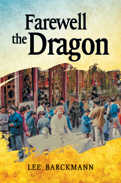
 |
Napoleon is frequently credited with describing China thusly: “There lies a sleeping giant. Let him sleep. For when he awakens he will move the world.” For centuries China has been viewed by Westerners as a mystery. In this novel, we have a Westerner embroiled in a murder investigation in mysterious China. As the mystery unfolds, so too does a bit of the country’s impenetrability—thanks to the insightfulness and reportage of the author. Barckmann freely admits that even the Chinese don’t totally understand this ancient land, its customs, and its people. But through his storytelling, we get a closer look at this enigmatic world, and we do so while being thoroughly entertained in the process.
The year is 1987. The cold war is slowly winding down. In Beijing, two foreigners are found dead of gunshot wounds in what initially appears to be murder followed by suicide. But as is often the case, things may not be what they seem. Nate is an American in China who ostensibly teaches English but also sells software on the side. A large section of the novel involves the Chinese police’s interrogation of Nate. Through that grilling, readers learn of Nate’s life, his relationship with his Montana cowgirl fiancé, other women who sometimes share his bed, and a fascinating flock of expatriates he frequently carouses with in China’s capital city.
Barckmann does a first-rate job of bringing these expats to life on the page. There’s a Croatian who seems to see all, know all, and frequently tell all. There are Russian heavy drinkers, a rowdy Australian, East and West German women, a Hungarian who befriends an outcast Chinese, a Japanese beauty, an American spy who seems to be stealing Nate’s fiancé, and more. The author also introduces some vividly colorful Christians disguised as rabid capitalists who are convinced that the Chinese are actually one of the lost tribes of Israel and are primed for massive conversion.
To go too deeply into the plot would spoil many of Barckmann’s surprises, of which there are many. Let’s just say that on top of the murder there is a scheme afoot to purloin an ancient artifact and spirit it out of the country. Crime, punishment, and self-examination help tie all the loose ends together. But something far more ambitious is at work here than a complicated whodunit. In his book, Barckmann is reaching for a depiction of time and place and character that rivals more classic tales of flawed individuals struggling with their exotic environments and their own shortcomings. At one point the author reflects upon Nate’s reading of Graham Greene’s A Burnt-Out Case while Nate himself is actively burning his own candle at both ends. There are similarities also in flaws, introspection, regret, and the resolve to do better, which echo Greene’s characters, as well. Nate is a tad younger than many of Greene’s protagonists, and he often seems more hedonistic and less world-weary than the great British author’s. Still, this is not bad company to find oneself in.
The writing in Barckmann’s book often hits high notes in languid passages devoted to the exquisiteness of classical Chinese music, or in the quiet splendor of palatial palaces turned into Peoples’ parks, or the empty, silent streets surrounding official state buildings where even the cab drivers memorize conversations to be retold to ever-vigilant bureaucrats. Barckmann’s extensive and detailed recounts of Nate’s interactions with each of the aforementioned players in this drama sometimes restrain the pace. One gets the feeling that less backstory and more energy might have helped the story tell itself more efficiently. But if a novel is involving, as this one is, time is a small price to pay for a ticket to China and immersion in a world of paradox, passion, and pipe dreams that still one day might come true.
RECOMMENDED by the US Review